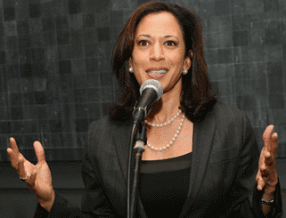Harris tempts challengers with ‘blood sport’ politics
by James Poulos | March 31, 2015 12:31 pm
 Attributing her success to a “blood sport” view of politics, California Attorney General Kamala Harris has established herself as the leading contender to replace Sen. Barbara Boxer, D-Calif., who is retiring in Jan. 2017.
Attributing her success to a “blood sport” view of politics, California Attorney General Kamala Harris has established herself as the leading contender to replace Sen. Barbara Boxer, D-Calif., who is retiring in Jan. 2017.
“I always start my campaigns early, and I run hard,” Harris told[1] the New York Times. “Maybe it comes from the rough-and-tumble world of San Francisco politics, where it’s not even a contact sport — it’s a blood sport. This is how I am as a candidate. This is how I run campaigns.”
But that attitude has helped set up what could be a difficult dynamic for Harris in her quest for the Senate.
She has cleared away key potential competitors from Northern California, such as Lt. Gov. Gavin Newsom, who has opted to run for governor in 2018. But Harris has not dispatched credible Democratic contenders in the Southland, including Rep. Adam Schiff of Burbank, Rep. Xavier Becerra of Los Angeles and Rep. Loretta Sanchez of Garden Grove. Then there are potential Republican contenders, such as Assemblyman Rocky Chávez of Oceanside.
For years, Southern Californian Democrats have chafed at what many have seen as an excessive degree of dominance within the state party by San Francisco and Sacramento-area members, including Boxer and Sen. Dianne Feinstein, both from Marin County; and Gov. Jerry Brown, the former mayor of Oakland.
A wide-open field
Harris’ aggressive approach to political advancement has helped knock one nationally recognized L.A. Latino out of the Senate scramble. Former L.A. Mayor Antonio Villaraigosa bailed out of contention late in February.
“I know that my heart and my family are here in California, not Washington, D.C.,” he said in a statement posted[2] to Facebook. “I have decided not to run for the U.S. Senate and instead continue my efforts to make California a better place to live, work and raise a family.” Villaraigosa’s decision was seen as signaling greater interest in pursuing a bid for governor.
Even though Villaraigosa himself was seen as one of Harris’ most formidable would-be rivals, his weaknesses as a candidate were far greater than other Southern California Latinos currently weighing serious Senate bids. Villaraigosa struggled[3] with personal scandal and an embarrassingly rough landing after leaving office, when he had to scrounge for lucrative work through personal connections and the strength of his name recognition.
Ironically, that opened the field for others to challenge Harris. The kind of travails Villaraigosa faced haven’t been a problem for Harris’ most likely Latino challengers. Schiff, Becerra and Sanchez have “been waiting for colleagues to retire so they can move up, and they still face the constant threat that even after biding their time, rivals could outmaneuver them,” the Los Angeles Times reported[4].
“But with scant hope that Democrats could seize control of the House next year, they are also stuck in the relatively powerless minority. Democrats stand a better chance of retaking the Senate, so the potential leap may be that much more tempting.”
Meanwhile, noted the Times, Harris still hasn’t made an impression on more than half of California’s registered voters, according to a poll conducted with USC Dornsife.
Pressure on the right
Despite expressing strong interest, neither Becerra[5] nor Sanchez[6] officially has declared their candidacy. For now, that gives an advantage to Chávez, the only other candidate to declare after Harris.
And within the California GOP, as the Sacramento Bee observed[7], his “résumé and standing as a state legislator make him the most prominent Republican among those weighing bids. A former city councilman in Oceanside, he spent nearly three decades in the Marines and later served as acting secretary to the state Department of Veterans Affairs.”
Chávez’s political positioning also has raised hurdles for other Republicans considering a run. “He supports gay marriage and has chided members of his own party for blocking immigration reform,” noted the Bee. “He opposes abortion rights, however, a position he attributes to his Catholic upbringing.”
Running to the left or the right of Chávez could pose problems for GOP rivals. That could inspire the state party to rally around him relatively early. Although not an electoral cure-all, California Republicans could score a perceived coup by fielding a Latino candidate against Harris.
“A lot of things can happen on the way to a coronation,” Chávez recently told[1] the New York Times.
- told: http://www.nytimes.com/2015/03/28/us/politics/kamala-harris-californias-attorney-general-leaps-to-forefront-of-race-for-barbara-boxers-senate-seat.html?_r=0
- posted: http://www.washingtonpost.com/blogs/post-politics/wp/2015/02/24/villaraigosa-wont-run-for-senate-in-california/
- struggled: http://www.laweekly.com/news/antonio-villaraigosas-quest-for-wall-street-washington-and-wealth-2613933
- reported: http://www.latimes.com/local/politics/la-me-pol-senate-candidates-20150320-story.html#page=1
- Becerra: http://www.sacbee.com/news/politics-government/capitol-alert/article16959236.html
- Sanchez: http://www.c-span.org/video/?c4532575/rep-loretta-sanchez-running-us-senate
- observed: http://www.sacbee.com/news/politics-government/capitol-alert/article12602606.html
Source URL: https://calwatchdog.com/2015/03/31/harris-tempts-challengers-with-blood-sport-politics/